 W
WAli Mardan Khan was a Kurdish military leader and administrator, serving under the Safavid kings Shah Abbas I and Shah Safi, and later the Mughal ruler Shah Jahan. He was the son of Ganj Ali Khan. After surrendering the city of Qandahar, part of the easternmost territories of the Safavids to the Mughals in 1638, he served with distinction in the Mughal administration, earning the highest honors of the Mughal court.
 W
WUdrea Băleanu, also known as Băleanul, Banul Udrea, or Udrea of Băleni, was a Wallachian and Moldavian statesman and military commander. He was especially noted as a key supporter, and alleged uncle, of the unifying Prince Michael the Brave, serving under his command in the Long Turkish War. In the early stages of Michael's revolt against the Ottoman Empire, Băleanu drove the Wallachian military forces into Rumelia, relieving Nikopol. He served as Ban of Oltenia, then commanded supporting contingents in the 1599 campaign to annex Transylvania. The following year, Michael employed him as one of his four regents in Moldavia, and also made him commander of the Moldavian army, with the title of Hetman. This assignment made Băleanu a direct enemy of the Movilă dynasty, which claimed the Moldavian throne, and of the Movilăs' backers in the Polish–Lithuanian Commonwealth.
 W
WJames Barry, 4th Earl of Barrymore was an Irish soldier and Jacobite politician.
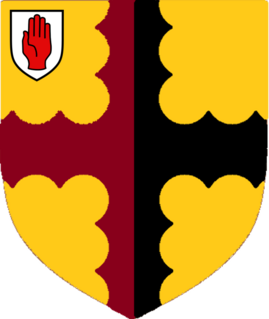 W
WSir Henry Brooke, 1st Baronet was an English soldier and politician.
 W
WDiicul or Dicul Buicescul, also known as Diicu Buicescu and Diicu din Epotești, was a Wallachian statesman, noted as the designated heir of Prince Matei Basarab. A commoner on his father's side, he belonged to the boyardom of Oltenia through his mother's family. His political rise began when Matei, his maternal relative, seized the throne. Diicul alternated civilian offices and command postings in the Wallachian military forces, culminating with his appointment as Spatharios in January 1645. His main military involvement came during the wars opposing Wallachia and the Principality of Transylvania to Vasile Lupu's Moldavia. He saw action during the 1650 invasion of Moldavia, resulting in Gheorghe Ștefan's appointment as the puppet Moldavian Prince. In 1653 Buicescul was soundly defeated by Lupu and his Cossack allies, whose invasion of Wallachia was only overturned by Prince Matei's stand at Finta.
 W
WSir John Burgh was a 17th-century English soldier and military commander in the Protestant army commanded by Horace Vere in the Electorate of the Palatinate, during the Eighty Years' War and the Thirty Years' War.
 W
WRobert Byerley (1660–1714), of Middridge Grange, Heighington, county Durham, and Goldsborough, Yorkshire, was an English soldier and Tory politician who sat in the English and British House of Commons between 1685 and 1714. He is credited with capturing the Byerley Turk, a famous stallion considered one of the three major foundation sires of the Thoroughbred breed of race horse.
 W
WGeneral Charles Churchill was a British Army officer who served during the War of the Spanish Succession and an English politician who sat in the English and British House of Commons from 1701 to 1710. He was a younger brother of John Churchill, 1st Duke of Marlborough and both his military and political careers were closely connected with his brother's. Along with Marlborough's Irish Chief of Staff William Cadogan, he was one of Churchill's closest advisors. He was a Tory, in contrast to his Whig brother who tolerated and possibly used Churchill's Tory connections.
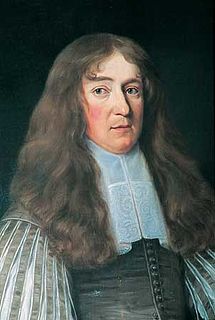 W
WSir Winston Churchill, known as the Cavalier Colonel, was an English soldier, nobleman, historian, and politician. He was the father of John Churchill, 1st Duke of Marlborough.
 W
WMajor general (generalfältvaktmästare) Samuel Cockburn was a Scottish soldier in the service of Sweden. He was born around 1574 in Scotland. He entered Swedish service in 1598 where he participated in the Swedish civil war between Sigismund Vasa and Duke Karl Karl IX.
 W
WJohn Colepeper, 1st Baron Culpeper of Thoresway was an English royalist landowner, military adviser and politician who, as Chancellor of the Exchequer (1642-43) and Master of the Rolls (1643) was an influential counsellor of King Charles I during the English Civil War, who rewarded him with a peerage and some landholdings in Virginia. During the Commonwealth he lived abroad in Europe, where he continued to act as a servant, advisor and supporter of King Charles II in exile. Having taken part in the Prince's escape into exile in 1646, Colepeper accompanied Charles in his triumphant return to England in May 1660, but died only two months later.
 W
WThe Rt Hon. Edward Conway, 2nd Viscount Conway, PC, was an English politician, military commander, bibliophile and peer.
 W
WEdward Cromwell, 3rd Baron Cromwell was an English peer. He was the son of Henry Cromwell, 2nd Baron Cromwell by his wife Mary, daughter of John Paulet, 2nd Marquess of Winchester and his first wife Elizabeth Willoughby. His grandfather, Gregory, son of Thomas Cromwell, chief minister to Henry VIII, was created Baron Cromwell on 18 December 1540.
 W
WCount Erik Jönsson Dahlbergh was a Swedish military engineer, Governor-general and Field marshal. He rose to the level of nobility through his military competence. As an architect and draftsman, he was renowned for fortification works. He is most known for his collection of engravings Suecia Antiqua et Hodierna, a collection of engravings of topographical research.
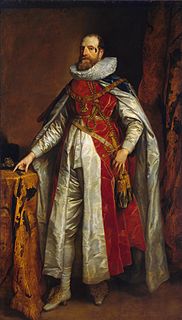 W
WHenry Danvers, 1st Earl of Danby, KG was an English soldier. Outlawed after a killing, he regained favour and became a Knight of the Garter.
 W
WWilliam Cavendish, 1st Duke of Devonshire was an English soldier, nobleman, and Whig politician who sat in the House of Commons from 1661 to 1684 when he inherited his father's peerage as Earl of Devonshire. He was part of the "Immortal Seven" group that invited William III, Prince of Orange to depose James II of England as monarch during the Glorious Revolution, and was rewarded with the elevation to Duke of Devonshire in 1694.
 W
WSir George Downing, 1st Baronet was in turn a preacher, soldier, statesman, diplomat and spymaster and politician whose allegiances notably changed during his career, and after whom Downing Street in London is named. As Teller of the Exchequer he is credited with instituting major reforms in public finance. His influence on the passage and substance of the mercantilist Navigation Acts was substantial. The Acts protected English maritime commerce from competition, especially competition from the Netherlands, and led to the increase in the size of the English merchant fleet and of the Royal Navy that protected it. They are credited with contributing to the security of the English state and its ability to project its power abroad, but may have stunted potential developments in shipbuilding and operation by stifling competition.
 W
WAlexander Seton Montgomerie, 9th Earl of Eglinton was a Scottish peer.
 W
WPatrick Ruthven, 1st Earl of Forth and 1st Earl of Brentford was a Scottish nobleman, general, and diplomat.
 W
WHenry Rich, 1st Earl of Holland, known as Lord Kensington between 1623 and 1624, a member of the influential Rich family, was an English courtier, peer and soldier.
 W
WRalph Hopton, 1st Baron Hopton,, was an English politician, soldier and landowner. During the 1642 to 1646 First English Civil War, he served as Royalist commander in the West Country, and was made Baron Hopton of Stratton in 1643.
 W
WMajor General Rowland Laugharne was a member of the Welsh gentry, and a prominent soldier during the Wars of the Three Kingdoms, in which he fought on both sides.
 W
WSir John Lenthall was an English Member of Parliament. He was elected MP for Gloucester in 1645, knighted by Oliver Cromwell in 1658 and made Governor of Windsor Castle from 1657 to 1660. After the 1660 Restoration of the Monarchy he was pricked Sheriff of Oxfordshire for 1672–73 and knighted a second time by Charles II in 1677.
 W
WStroe Leurdeanu, also known as Stroe (sin) Fiera, Stroie Leurdeanu, Stroe Leordeanu, or Stroe Golescu, was a Wallachian statesman and political intriguer, son of Logothete Fiera Leudeanu. He began his career with the Wallachian military forces, serving as Spatharios and seeing action in the Polish–Ottoman War of 1633. Related by marriage to the Craiovești dynasty, he emerged as one of the country's most important officials under Prince Matei Basarab: as Vistier, he was in charge of the princely treasury, and also became a regent in 1645. Matei also adopted Stroe's son, Istratie Leurdeanu, but in 1651 turned against the family, and found Stroe guilty of embezzlement. He returned to high favor under a new Prince, Constantin Șerban, who made him his Logothete.
 W
WAlexander Leslie, 1st Earl of Leven was a Scottish soldier in Swedish and Scottish service. Born illegitimate and raised as a foster child, he subsequently advanced to the rank of a Swedish Field Marshal, and in Scotland became Lord General in command of the Army of the Covenanters, privy councillor, captain of Edinburgh Castle, Lord Balgonie and Earl of Leven. In England he commanded the Army of the Solemn League and Covenant and was senior commander of the Army of Both Kingdoms (1642–1647).
 W
WJames Lumsden (1598–1660) was a Scottish soldier who served in the Swedish army of Gustavus Adolphus during the Thirty Years' War, and subsequently commanded Scottish Covenanter armies.
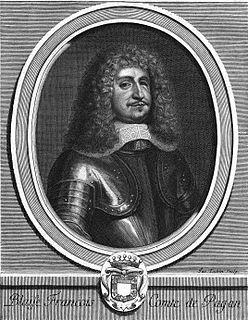 W
WBlaise François Pagan (1603–1665) was a French soldier and military engineer who served in the army of Louis XIII. His military career ended in 1642 when he lost his sight and in 1645, he published Les Fortifications; this became the dominant text of its era on military fortifications and significantly influenced Sébastien Le Prestre de Vauban.
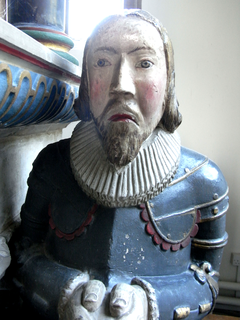 W
WSir Francis Popham (1573–1644) of Wellington, Somerset and Littlecote, Berkshire, was an English soldier and landowner who was elected a Member of Parliament nine times, namely for Somerset (1597), Wiltshire (1604), Marlborough (1614), Great Bedwin (1621), Chippenham 1624, 1625, 1626, 1628–29), and for Minehead (1640–1644).
 W
WSir James Ramsay, known as "Black Ramsay", was a Scottish soldier in the Swedish service.
 W
WSir John Ratcliffe or Radcliffe was an English soldier and politician who sat in the House of Commons between 1614 and 1626. He was killed in action in France during the Siege of Saint-Martin-de-Ré.
 W
WBernardino de Rebolledo y Villamizar, Earl of Rebolledo and Graf (Count) of the Holy Roman Empire was a Spanish poet, soldier and diplomat. He was a descendant of the 1st Count of Rebolledo, don Rodrigo, who received his surname and title from the king of Asturias and León don Ramiro I in 815 during the Reconquista.
 W
WSir Carew Reynell was an English courtier, soldier and politician who sat in the House of Commons at various times between 1593 and 1622.
 W
WSir Robert Shirley was an English traveller and adventurer, younger brother of Sir Anthony Shirley and Sir Thomas Shirley. He is notable for his help modernising and improving the Persian Safavid army according to the British model, by the request of Shah Abbas the Great. This proved to be highly successful, as from then on the Safavids proved to be an equal force to their arch rival, the Ottoman Empire.
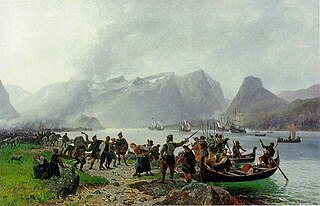 W
WGeorge Sinclair was a Scottish mercenary who fought in the Kalmar War, and was posthumously remembered in Norway and the Faroe Islands through the ballad Sinklars Visa.
 W
WJohn Smith was an English soldier, explorer, colonial governor, Admiral of New England, and author. He played an important role in the establishment of the colony at Jamestown, Virginia, the first permanent English settlement in America in the early 17th century. He was a leader of the Virginia Colony between September 1608 and August 1609, and he led an exploration along the rivers of Virginia and the Chesapeake Bay, during which he became the first English explorer to map the Chesapeake Bay area. Later, he explored and mapped the coast of New England. He was knighted for his services to Sigismund Báthory, Prince of Transylvania, and his friend Mózes Székely.
 W
WMirza Tughai Bey, Tuhay Bey sometimes also spelled as Tugai Bey was a notable military leader and politician of the Crimean Tatars.
 W
WSir Francis Vere was an English soldier, famed for his successful military career in the Low Countries.
 W
WRichard Wenman, 1st Viscount Wenman (1573–1640), was an English soldier and politician who sat in the House of Commons between 1621 and 1625. He was created Viscount Wenman in the Peerage of Ireland in 1628.